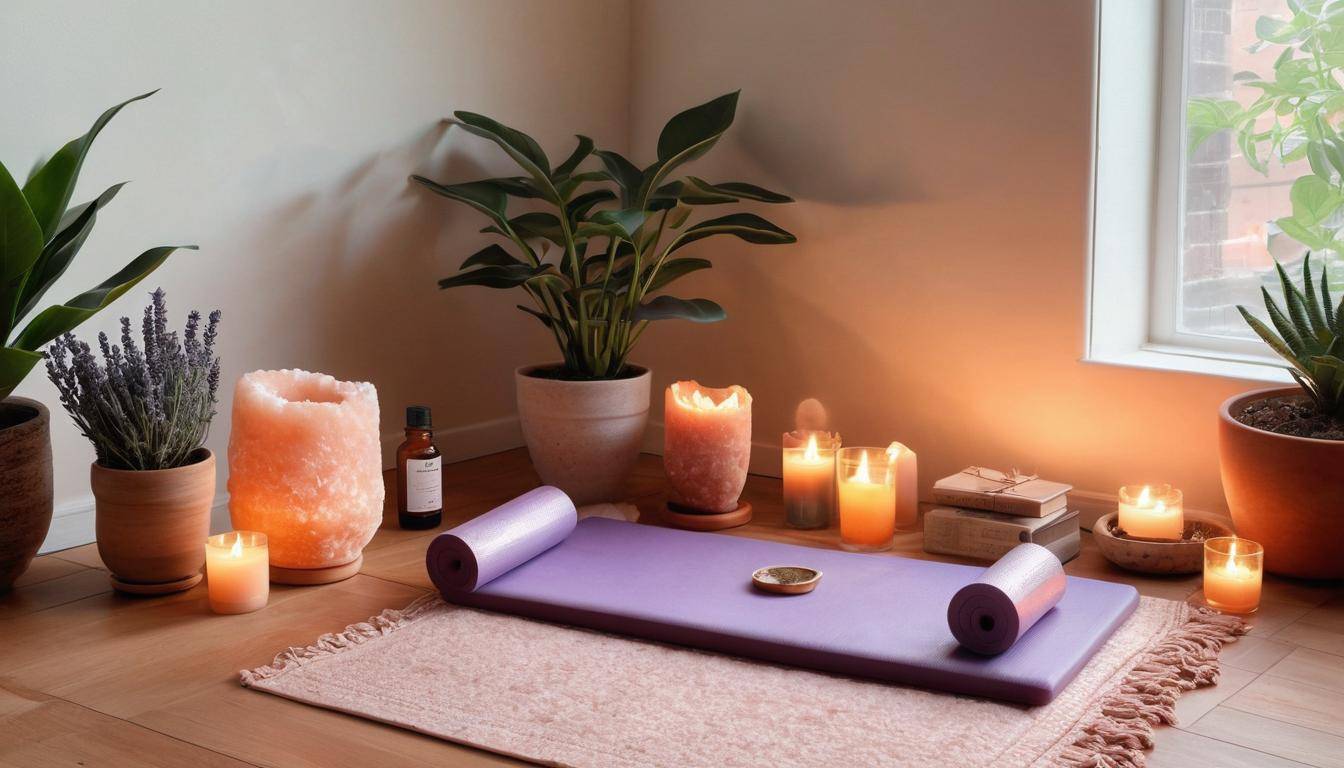Balancing work, personal life, and self-care can often feel like juggling too many balls at once. It’s no wonder that many of us find stress and anxiety creeping into our daily lives. Studies show that maintaining a solid self-care routine isn’t just beneficial; it’s essential for mental health and overall well-being. Imagine starting your day with a short yoga session or taking five minutes to meditate before bed—little steps like these can make a big difference without overwhelming your schedule.
Yet, the idea of self-care often carries misconceptions—it’s seen as luxurious or even selfish. But in reality, effective self-care can be both practical and transformative. Not only does it help manage stress, but it may also boost productivity by making you more focused and relaxed. We’ve gathered insights from experts and designed step-by-step guides to help you weave these practices seamlessly into your life. Here are some essential self-care routines that do exactly that…
Effective self-care routines for a balanced life include establishing daily practices such as maintaining a clean environment, engaging in regular physical activity like walking, and incorporating mindfulness techniques such as meditation and deep breathing. Additionally, prioritizing social connections by reaching out to friends and scheduling time for enjoyable activities can greatly enhance emotional well-being and contribute to overall life balance.

Essential Self-Care Practices
Incorporating self-care into our daily lives can seem overwhelming at first, but it doesn’t have to be complicated. Understanding how to effectively implement these practices is key to sustaining your mental well-being. For example, let’s explore practical strategies that can make a real difference in your day-to-day life.
What is Self-Care?
At its core, self-care is not merely the act of pampering ourselves; it’s an intentional commitment to prioritize our health and happiness. It acknowledges that we must recharge emotionally, mentally, and physically to face our daily challenges.
Simple actions like taking a moment to breathe deeply before responding in a stressful situation can work wonders over time. Deep breathing calms the nervous system and helps ground your emotions. While this may sound small, it exemplifies how self-care can intertwine seamlessly with daily routines, making it more effective in creating lasting change.
Types of Self-Care
-
Physical Self-Care: Engaging in regular exercise should feel invigorating rather than taxing. Consider finding an activity you enjoy—whether it’s gardening, dancing, or cycling—that keeps you moving without feeling like a chore. Coupled with a balanced diet rich in fruits and vegetables, you will likely notice improved energy levels and mood. Prioritizing adequate sleep by establishing a calming bedtime routine—perhaps with reading or herbal tea—can also work wonders for your overall well-being.
-
Emotional Self-Care: Take time regularly to check in with your feelings. Journaling is a powerful tool for emotional clarity; writing about your thoughts can help you process them more thoroughly. Engage in activities that spark joy—be it art, nature walks, or listening to uplifting music—and allow yourself moments of laughter. Offering yourself compassion during tough times is essential for nurturing emotional resilience.
-
Social Self-Care: Our connections with others are vital for emotional stability. Commit to scheduling regular catch-ups with friends or family, even if they’re virtual. Share your experiences openly; fostering positive relationships creates a network of support that can significantly enhance your life’s quality.
-
Spiritual Self-Care: For many, spirituality provides grounding and peace. Explore practices such as meditation or connecting with nature through hikes or quiet walks in the park. Engaging with spiritual beliefs—however you define them—can often provide valuable perspective during challenging times.
-
Financial Self-Care: Taking control of one’s finances is crucial for reducing anxiety related to money matters. Establishing a budget, saving regularly, or seeking financial advice can create a sense of security. The clearer your financial landscape appears, the calmer you’ll feel about future uncertainties.
Integrating these types of self-care into your life can create ripples far beyond the surface, leading to profound improvement in mental health and well-being overall. With a strong foundation in self-care practices established, the next step involves exploring how physical activity can further enhance your health journey.
Physical Health Through Exercise
Physical exercise anchors a healthy lifestyle and remains essential for achieving optimal well-being. Yet, with our busy schedules, it can easily slip down the priority list. It’s crucial to recognize that even small steps count. According to the World Health Organization, adults are encouraged to engage in at least 150 minutes of moderate-intensity or 75 minutes of vigorous-intensity exercise each week. This may sound daunting, but breaking it into manageable pieces makes it entirely achievable.
By integrating consistent movement into daily routines, individuals can improve not only their physical health but also their mental clarity.
Types of Beneficial Exercises
There are diverse types of exercises that are beneficial for everyone. Cardiovascular exercise, such as walking, jogging, or cycling, gets your heart rate up and improves overall heart health while assisting in burning calories. It’s about finding something that you enjoy; maybe it’s dancing or swimming. What’s important is that your body feels invigorated after movement.
Next, we have strength training, which can be done using weights, resistance bands, or even your own body weight. This type of workout plays a significant role in building muscle mass and boosting metabolism. Consider gentle strength training exercises like squats or push-ups to start; they can be done anywhere!
Lastly, don’t forget about flexibility and balance exercises. Incorporating practices such as yoga or Pilates is invaluable for enhancing flexibility and reducing injury risks as you age. These practices help restore balance in your body—physically and mentally.
Now that we’ve explored different types, let’s dive into how to get started with an exercise routine without feeling overwhelmed.
Beginner’s Guide to Starting Exercise
For those new to exercise, starting small is key. Begin with simple yet effective activities like a daily 15-minute walk during lunch breaks or after dinner. The goal should be consistency over intensity. Gradually increase the duration and intensity as your confidence grows—think of it like climbing stairs: one step at a time.
Another effective strategy is mixing up your routine to keep things exciting and comprehensive. You might alternate between cardio workouts one day and strength training the next. Not only does this prevent boredom, but it also ensures that you’re targeting different muscle groups and aspects of fitness.
Furthermore, tracking your progress can significantly enhance motivation levels. Utilize apps or journals to note down achievements, whether it’s increasing workout duration or lifting heavier weights. By visualizing progress, you’ll likely find yourself more engaged and accountable.
Integrating these practices not only lays the foundation for physical excellence but also opens doors to mental enhancement through stress reduction and emotional upliftment—important components for self-care and a balanced life as we transition into understanding the intricate dynamics of maintaining mental wellness.
Mental and Emotional Balance

Achieving mental and emotional balance is fundamental for our overall health, yet it’s often overlooked in the hustle of daily life. The beauty of mindfulness is that it helps anchor you in the present moment, providing clarity amidst chaos. This practice encourages us to step back, breathe, and observe our thoughts without judgment, ultimately leading to a greater sense of control over our emotions. Have you ever noticed how taking a moment to pause can completely shift your perspective?
Mindfulness practices like meditation offer an oasis of calm in our often turbulent minds. They help manage stress while cultivating positive emotions. Research has demonstrated that dedicating just 10 minutes to meditation each day can significantly lower anxiety levels while boosting feelings of happiness.
The Power of Mindfulness
Integrating mindfulness into your daily routine might sound daunting at first, but it can be seamlessly woven into the fabric of your everyday life. For instance, think of simple moments—like sipping your morning coffee or waiting at a traffic light—as opportunities to practice mindfulness. Use these instances to center yourself and reconnect with your breath, observing the sensations around you. Such small moments matter; they build up to create a lasting impact on your emotional state.
One way to embed mindfulness practice in your routine is through setting dedicated time blocks specifically for it. Rather than treating it as another task on your to-do list, approach it as an essential part of self-care, much like nourishment or exercise.
Incorporating Mindfulness into Daily Life
A structured approach can facilitate the incorporation of mindfulness into your daily activities:
Set a Routine: Designate specific times during your day for mindfulness practices, perhaps in the morning before work or in the evening before bed. Consistency builds habit, and soon it will feel natural.
Use Guided Meditation Apps: Platforms like Headspace or Calm provide user-friendly guided sessions perfect for those new to meditation.
Practice Deep Breathing: Throughout your day, take intentional breaks for deep breaths—this helps redirect focus and enhances clarity.
Engage in Journaling: Simply jotting down reflections or emotions can be incredibly cathartic. Aim for three things you are grateful for each day; this fosters a shift toward positivity.
Adding these strategies not only fosters mindfulness but also plays a significant role in managing stress, paving the way for improved mental clarity and emotional resilience.
Effective Stress Management Strategies

Finding ways to manage stress effectively is crucial to maintaining mental health and overall well-being. Start by understanding the significance of knowing what stresses you out. For example, if you often feel overwhelmed at work due to looming deadlines, recognizing this as a consistent trigger allows you to develop tailored strategies that specifically address it. It can be empowering to pinpoint these stressors because then you can create actionable plans instead of feeling adrift in anxiety.
Understanding Stress Triggers
Identifying the root causes of stress is the first step toward effective management. Common stress triggers include work pressures, financial concerns, and relationship issues. Recognizing these can help you tackle them more effectively. Suppose you find yourself frequently stressed about finances; acknowledging this enables you to set a budget or seek financial advice. Likewise, understanding work-related anxieties may lead you to discuss adjustments with your supervisor or change your workload. The goal here is awareness so that you can build a proactive approach, transforming stress from an overwhelming feeling into manageable challenges.
Practical Stress-Relief Techniques
Incorporating various techniques into your daily routine can provide relief from these identified stresses. For starters, exercise is one of the most effective methods. Engaging in physical activity not only releases endorphins—those wonderful ‘feel-good’ hormones—but also serves as a fantastic outlet for pent-up frustration. Even a simple walk around the neighborhood can work wonders for your mood.
Engaging in hobbies like reading, gardening, or crafting can be therapeutic too. These activities allow your mind to focus on something pleasurable and constructive instead of worries or obligations. Remember how relaxing it feels to lose yourself in a good book or transform a patch of dirt into a flourishing garden? That’s the power of hobbies!
Further, don’t underestimate the value of social support. Speaking to friends or a counselor can provide emotional relief. Sometimes just sharing your burden can lighten its weight significantly. Building a strong social network is an essential aspect of self-care; it’s like assembling your own team ready to support you during tough times.
Finally, consider time management as a stress-buster. Prioritize tasks and delegate when possible to avoid feeling overwhelmed. When facing an extensive list of responsibilities, take a moment to evaluate which tasks are urgent and which ones are not. This conscious effort helps keep feelings of anxiety at bay.
Incorporating these insights into your daily life fosters mindfulness and resilience against stressors, laying the groundwork for next steps in creating a personalized approach that resonates with your unique lifestyle.
Customizing Your Self-Care Routine
Personalizing your self-care strategies can make a significant difference in both the efficiency and enjoyment of your routine. Think about it: we are all unique individuals, each with different preferences and responses to various activities. Crafting a personalized routine helps you engage more deeply, allowing you to connect with activities that truly replenish your spirit and soothe your mind.
Personalized Self-Care Strategies
Let’s take a moment to consider how different personality types approach self-care. For example, introverts might find solace in solitary pursuits like curling up with a good book or taking a quiet stroll in nature. This allows them to recharge without feeling overwhelmed by social interactions.
On the other hand, extroverts tend to flourish when surrounded by groups; they may enjoy team sports, joining clubs, or engaging in community events that allow for connection with others. Recognizing these differences mirrors the importance of crafting a routine that speaks directly to who you are.
Steps to Personalize Your Routine
When customizing your self-care routine, begin by identifying your needs. Reflect on what areas of your life feel out of balance or neglected—this could involve assessing your physical health, emotional well-being, social connections, or financial stability. The better you understand where attention is needed, the more equipped you’ll be to design an effective plan.
Next, consider setting realistic goals for yourself. Rather than overwhelming yourself with an exhaustive list of things to do, start small. Focus on one or two activities that resonate most with you. This could mean committing to ten minutes of meditation daily or taking a short walk several times a week. Over time, as you cultivate these habits, adjust your goals gradually so they remain challenging yet attainable.
Keeping a reflective journal can be incredibly beneficial. Take note of how each activity impacts your mood and energy levels. This simple act can provide insight into what truly nourishes you while guiding necessary adjustments along the way.
Another key aspect is to seek feedback from trusted friends or professionals. Discussing your self-care journey with others can bring fresh perspectives and ideas you might not have considered. A thoughtful friend may suggest practices that align well with your personality or experiences shared by others who have navigated similar paths.
By tailoring self-care routines to fit individual preferences and needs, you’re setting yourself up for success in creating more meaningful experiences that enhance overall well-being. From this point forward, we explore the enduring advantages that these personalized practices contribute to daily life.
Long-Term Benefits of Self-Care
Sustaining self-care practices can yield profound benefits that extend beyond mere relief from stress. It nurtures not only physical wellness but also bolsters mental resilience. When individuals dedicate time to themselves, they significantly reduce the risk of chronic illnesses.
A study published by the American Psychological Association found that routine self-care significantly lowers risks of chronic illness by reducing stress and promoting overall health. This invaluable knowledge underscores the importance of making self-care a regular part of our lives, enabling us to enjoy longer, healthier futures.
The Sustainable Impact
The impact of consistent self-care manifests in a sustainable way throughout one’s life. Individuals report increased energy and motivation as they prioritize their well-being. Statistical research indicates that self-care routines lead to better management of physical ailments such as headaches or digestive issues. Moreover, 74% of those who practice regular self-care activities report better emotional balance than those who do not. Those small efforts add up, creating a trajectory toward a healthier lifestyle.
Real-Life Testimonials
As Sarah, a 34-year-old teacher, reflects: “Incorporating yoga and meditation into my daily routine has profoundly impacted my mental well-being. I feel more centered and capable of handling challenges.” Stories like Sarah’s highlight how personal investments in self-care can lead to transformative effects in dealing with everyday struggles and adapting to life’s ups and downs.
This personal growth becomes part of a broader context that affects other areas of life.
The Ripple Effect
Regular self-care not only improves individual health but also positively influences relationships and professional performance. When you feel good about yourself, you’re more likely to approach interactions with warmth rather than frustration. A consistent self-care routine instills a sense of peace and satisfaction that strengthens bonds with family and friends while fostering productivity at work. When you are emotionally centered, navigating workplace dynamics becomes easier, allowing for better collaboration and communication.
Indicators of Effective Self-Care
| Indicator | Benefit |
|---|---|
| Improved Sleep Patterns | Enhanced physical health |
| Increased Productivity | Better performance at work |
| Emotional Stability | Stronger interpersonal relations |
The indicators above highlight how effective self-care translates into measurable outcomes in our lives. For instance, those who invest time in sleep hygiene often notice improved focus at work as well as less irritability during daily interactions. Being emotionally stable enables deeper connections with others.
Investing in self-care isn’t selfish; it’s essential. Prioritizing your well-being allows you to be more present and effective in other areas of your life, enriching both personal experiences and professional endeavors.
As we recognize these lasting advantages, remember that nurturing yourself ultimately cultivates a flourishing environment for those around you as well. Visit Archie Foundation for more in-depth articles and resources to help you build a balanced life.
By embracing these practices and understanding their far-reaching effects, you create a foundation not only for your own well-being but also for the people around you. Prioritizing self-care ultimately leads to thriving relationships and enhanced life satisfaction.
